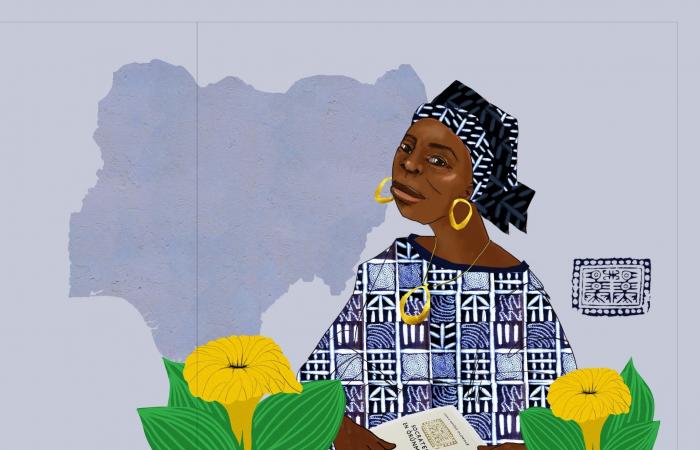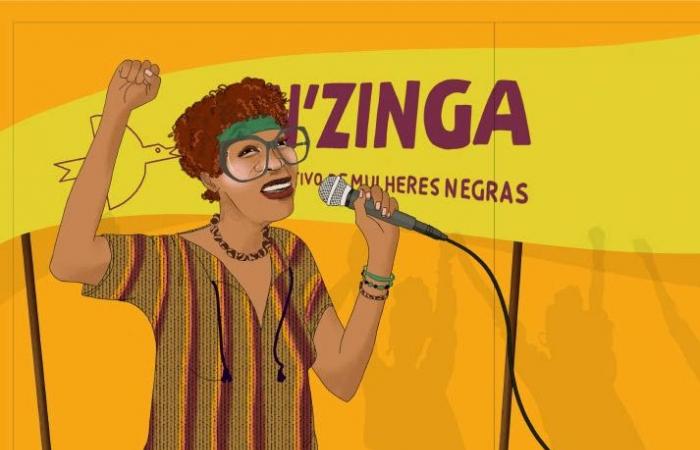History is not told by women and much less black women. This was the starting point of the Venezuelan journalist Zinthia Palomino (Maracaibo, Venezuela, 37 years old) to write Black women in philosophy (Babidi-Bú), an enlightened book published in late 2024 essentially aimed at a children’s audience, in which it crumbles the contributions of 12 philosophers, historian or black and Afro-descendant anthropologists.
“History is full of hundreds of black women and women who have thought about the world,” argues the author. But their voices “have been relegated to the background” and often associated with an “intellectual inferiority.” “This offers us a story narrated mainly by men,” he adds, in an interview with this newspaper, coinciding with the presentation of his book in the Afro space in Madrid.
Palomino took two years to investigate, or as she says, “dig up the story” to find 12 profiles that made visible the importance of “the black woman as the creator of a philosophical narrative away from the Eurocentric paradigm.”
In the pages of his book there are great women already deceased, such as the Nigerian philosopher Sophie Bosede Oluwole, a great defender of the oral traditions of her country, or the Brazilian Lélia Gonzalez, who promoted an Afro -American American vision of feminism. But also living voices such as the Jamaican essayist, Sylvia Wynter, researcher of colonialism and post -colonialism, or the Brazilian philosopher Djamila Taís Ribeiro, author of the book Small anti -racist manual.
Sophie Bosede Oluwole, Nigerian philosopher

Sophie Bosede Oluwole (Nigeria, 1935-2018) was the first woman to obtain a PhD title in Philosophy in Nigeria. He focused his research on the struggle for the recognition and dismissal of African philosophy, and investigated how the western imaginary – which affirmed that African people have no philosophy – has left him aside and invisible. He promoted the philosophical value of Nigerian oral traditions, through Yoruba philosophy – which comes from an ethnic group (with greater presence in Nigeria) – and compared it with the western one in order to prove that they were equally valid.
Lélia Gonzalez, Brazilian Philosopher
Lélia Gonzalez (Brazil, 1935-1994) was a philosopher, anthropologist, teacher and feminist. The Brazilian black movement was leader. Their reflections were framed in the race, gender, society and culture, and in the inequality of Latin American Afro -descendant women. Proposed the concept Amephricanity For the descendants of Africans who arrived by the transatlantic trafficking of slaves. He made a criticism of Hegel for stating that Africa lacks history.
Palomino, who arrived in Spain from Venezuela at age 22, began to self -state as a Afro -descendant when migrating. In this search for accelerated identity by exile, he was aware that three circumstances were essential: being a woman, migrant and Afro -American.
On that path created the platform Black women who changed the world, and educational project within which your first book is framed Black women in science, and also the latter. “We have thought about the world through reasons such as gender, class and race, and from that place we have made philosophy, but we have been invisible because we have denied the right to speak in certain spaces,” explains Palomino.
Diversity is not normalized or present. It is an urgency to be able to look to the future in a more integrated and global way
According to the author, the racism that “permeates” societies and the “inferiority” with which migrants are contemplated are “more evident” in Spain than in their native country. The data is right: discrimination and hate speeches in social networks measured by the Spanish Observatory against racism and xenophobia (Oberaxe) since January of this year show that of the more than 33,000 messages detected, more than 70% have as white to people in North Africa, 11% to Muslims and 10% to Afro -descendants.
“Spain looks Blanca and denies diversity in its territory, referring only to migration from the sixties. But ethnic and cultural diversity is previous and has been installed in Spanish society centuries,” says the Venezuelan author.
Palomino estimates that racism especially affects children, for example in educational spaces, where the author considers that diversity is not always present. “The absence of referents undoubtedly limits the process of identity construction. Diversity is not normalized or present, but it is an urgency to be able to look to the future in a more integrated and global way,” he emphasizes. Hence his book is dedicated to a child public, hoping that he also arrives at “the adult who will help him read it.”
Palomino ends the interview remembering the video he received with the reaction of a seven -year -old girl to see the cover of her book. “It’s like me,” said the little girl looking at the Enlightenment, who represents Djamila Ribeiro, with her book Small anti -racist manualin one hand and with a microphone in the other. For the author, not only has the representation of the color of the skin or hair, but it is crucial that girls can be recognized in the portrait of a scientific or philosopher woman. “It allows you to have more chances of projecting in the future. Because how can we yearn for something we have not seen?” He asks.







